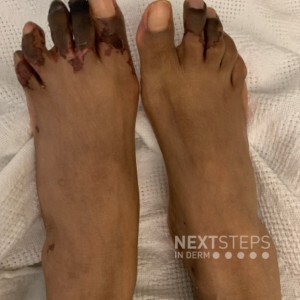
The correct answer is B. Anti-histone.
This patient is presenting with signs and symptoms concerning for anti-phospholipid antibody syndrome (APS). Anti-histone antibodies are typically only present in the setting of drug-induced systemic lupus erythematosus (SLE), which is extremely unlikely given that this patient’s only medication is albuterol. Common culprit medications for drug-induced SLE are procainamide, hydralazine, isoniazid, and minocycline.
Patients with APS commonly have the remaining listed positive antibodies. APS is an autoimmune disease characterized by antiphospholipid antibodies (aPL) associated with thrombosis and/or pregnancy morbidity. Most APS events are directly related to thrombotic events, which may affect small, medium or large vessels. Other clinical features like thrombocytopenia, nephropathy, cardiac valve disease, cognitive dysfunction and skin ulcers (called non-criteria manifestations) add significant morbidity to this syndrome and represent clinical situations that are challenging. APS was initially described in patients with systemic lupus erythematosus (SLE) but it can occur in patients without any other autoimmune disease. Despite the autoimmune nature of this syndrome, APS treatment is still based on anticoagulation and antiplatelet therapy.
References: PMID: 29451664
